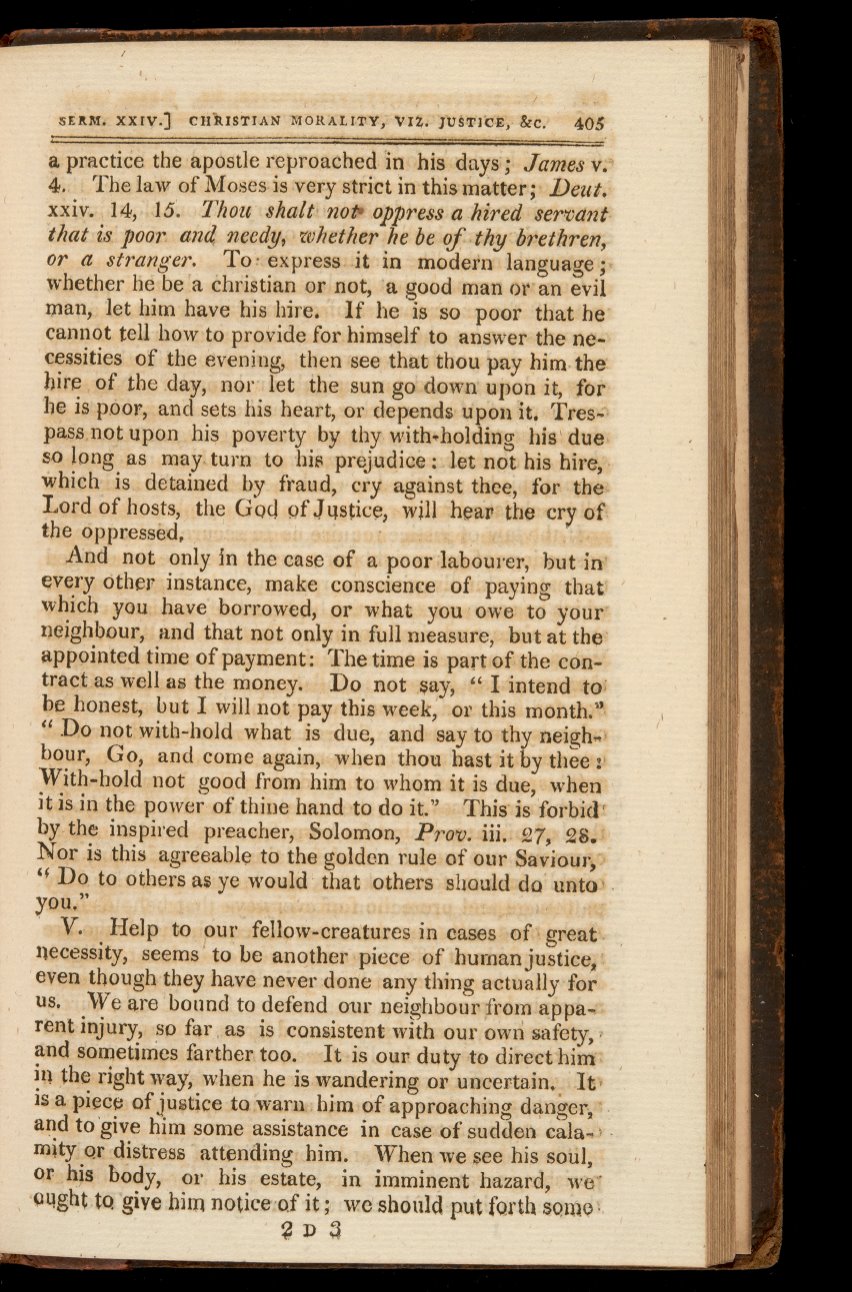

sERM. XXIV.3 CIIRISTIAN MORALITY, VIZ. JÚSTICEy
áCC.
405
a
practice
the apostle
reproached
in his days
;
James
v.
4.
The
law
of
Moses
is
very
strict
in
this
matter;
Deut.
xxiv.
14, 15.
Thou
shalt
nog
oppress
a hired
servant
that
is
poor and
needy,
whether
he
be
of
thy brethren,
or
a stranger. To.
express
it
in
modern language
;
whether
he
be
a
christian
or
not, a
good man
or an
evil
man,
let
him
have
his
hire.
if
Ile
is so
poor that
he
cannot
tell how to
provide for himself
to
answer the
ne-
cessities
of
the
evening,
then
see
that
thou pay
him
the
hire
of
the
day,
nor
let
the sun go down upon
it,
for
be
is
poor, and
sets his
heart, or depends upon it.
Tres-
pass
not upon
his
poverty
by
thy with
-
holding
his
due
so
long
as
may.
turn
to
his
prejudice
:
let not
his
hire,
which
is
detained
by
fraud,
cry
against
thee, for
the
Lord
of
hosts,
the
God
of
Jgstice,
will
hear
the
cry
of
the
oppressed,
And
not
only in
the
case
of
a
poor labourer,
but
in»
every
other
instance, make conscience
of
paying
that
which
you have borrowed,
or what
you owe
to your`
neighbour, and
that
not
only in full measure,
but at
the
appointed
time
of
payment:
The
time
is
part of
the
con-
tract
as
well as
the
money.
Do not
say,
"
I
intend to
be honest,
but
I
will
not
pay this
week,
or
this
month.
"
Do not
with
-hold what
is
due, and
say to
thy neigh-,
bour,
Go, and
come again, when
thou hast
it
by
thee
With
-hold not
good from him to whom
it
is
due, when
it
is
in
the
power of
thine hand to
do
it."
This
is
forbid'
by
the inspired preacher,
Solomon,
Prov.
iii.
27,
28.
Nor
is
this
agreeable to the golden rule
of
our
Saviour,
"
Do
to
others
as
ye
would
that
others
should do
unto
you"
V.
Help
to
our
fellow-
creatures
in
cases
of
great
necessity, seems to be
another
piece
of
human
justice,
even
though they have never done any thing actually for
us.
We
are
bound
to defend
our neighbour
from
appa-
rent
injury,
so
far
as
is
consistent
with
our
own safety,
and sometimes
farther
too.
It
is
our duty
to
direct
him
in
the right
way,
when he
is
wandering or uncertain.
It
is
a
piece
of justice
to
warn
him
of
approaching danger,
and
to give
him
some assistance in
case
of
sudden cala
mity
or distress
attending
him.
When
we see his
soul,
or
his
body,
or
his
estate, in
imminent
hazard,
we`
aught to
give
hiir
notice
of
it;
we should
put
forth
somo
D

















